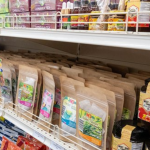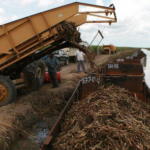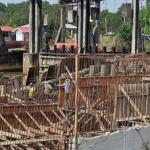During his presentation today at the 37th session of the United Nations Food and Agriculture Organization (FAO) Regional Conference for Latin America and the Caribbean, Agriculture Minister, Zulfikar Mustapha said in order for member states to achieve better production, sustainable consumption and production patterns through efficient and inclusive food and agriculture supply chains at the local, regional and global levels must be guaranteed.
Minister Mustapha was at the time presenting Guyana’s position on the interventions needed to achieve better production, focusing on innovative small-scale family farming and small and medium enterprises in the agri-food sector.
“Better production means ensuring resilient and sustainable agri-food systems in the face of climate change and its impact on the environment, since the food and nutrition security of our countries, depends on a sustainable and productive agriculture sector. To improve food security, the efficient cultivation, and production of traditional and non-traditional primary agricultural products, and increase production and diversification of processed agricultural products, emphasis has to be placed on higher and more advanced degrees of commercialization embracing specialized production, and the increased importance of Research and Development (R&D) and use of technology,” Minister Mustapha said.
Noting the agriculture sector’s vulnerability to climate change and the negative impact that it can have on food security, Minister Mustapha maintained that regional leaders and policymakers must be innovative in their efforts to ensure better production.
While giving an overview of Guyana’s efforts so far in this regard, Minister Mustapha said the government has been encouraging and investing in innovations with a focus on productivity improvements driven by research and development, strengthening climate resilience, advancing the use of technology, and intensifying improved land and water management practices.
“In the area of research and development, over the years and Guyana has released high-yielding rice varieties such as the GRDB16 which has the potential of producing nine tonnes per hectare once good agronomical practices are exercised. This particular variety can germinate in up to nine inches of water and takes just 110 days to fully mature. We’ve also had successful trials of biofortified rice which is intended as a sustainable, cost-effective means of delivering target micronutrients to populations that have weak access to such diets. In the area of livestock, Guyana is making a stride to improve research and technology by developing desired genetic material for livestock species. We’ve also been pushing for the use of shadehouse technology as an adaptive strategy to the threats of climate change. In 2021, 150 shade houses were constructed, while in 2022, in excess of 200 shade houses are targeted for construction,”
Flood Early Warning System and Innovation in Digital Solutions
Minister Mustapha also highlighted the fact that Guyana remains extremely susceptible to hydrometeorological hazards such as floods and droughts and that a National Flood Early Warning System was designed for the prediction of extreme flood events.
This system, he noted, supports and strengthens the Guyanese flood forecasting practices and flood early warning system activities.
Innovation in digital solutions has also been an area where the government has, since taking office in August 2020, promoted within the agriculture sector. Many commercial farmers in Guyana have also utilized drone technology as a more cost-effective and less labour-intensive way of applying critical inputs at various stages of cultivation.
Minister Mustapha said that the use of drones is steadily growing as an effective approach to sustainable agricultural management, as it contributes to greater efficiency in production and lower production costs.
“This year the Guyana Rice Development Board will be utilizing the T20 Drones for the spraying of pesticides. The drone technology will also help with data mapping, environmental monitoring, surveying, and prospecting. One of the main constraints of implementing drone technology is that it requires a specialized data pipeline. As we build capacity in the use of agricultural drones, a data system for drone technology will be established,” the minister noted.
In addition to his presentation, Minister Mustapha also served as Chair of today’s session at the conference. The conference is scheduled to end this Friday.







